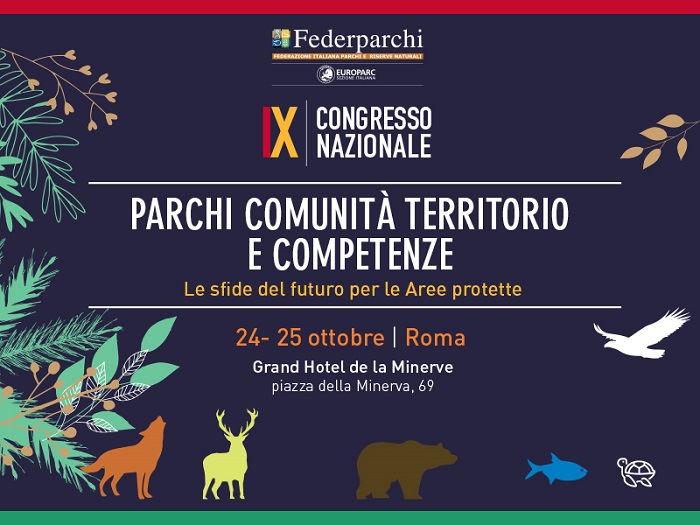Federparchi EUROPARC Italy: The re-election of Giampiero Sammuri and the outcomes of the IX Congress
The Council of Federparchi – Europarc Italia, gathered yesterday in Rome and unanimously re-elected Giampiero Sammuri as the President of the Italian Federation of Parks. Sammuri has held the presidency of Federparchi since 2010, and will be in the position until 2021. In addition, he is also the President of the Tuscan Archipelago Park. His election took place after the IX Federparchi Congress held on October 24 and 25.
We have a new Advisory Board of Park Directors full of skills. I am confident about the work that awaits us for the Italian Protected Areas, and I thank everyone for their trust.
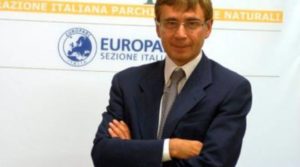
About the IX Congress of Federparhi-EUROPARC Italy
Proposal to IMPROVE THE EFFECTIVENESS OF PROTECTED AREAS
On the occasion of the IX National Congress of the Italian EUROPARC Section, Federparchi President Giampiero Sammuri illustrated proposals to promote functionality and rationality in the management of park entities, stressing how Parks can be a model of sustainable development for the whole country.
“We think that the critical issues of the parks can be solved in part by some simple measures, for instance, trying to make park statements more flexible – working on a balance for budgets and make them not so strict as they are now,” said Sammuri. In addition, he added
there is the need to hire young and capable technicians that the parks absolutely need, including qualified biologists, veterinarians, geologists, zoologists.
Referring to the “Park Managment Plans” Sammuri stressed that “they are born as an instrument of valorization of the territory and of the communities but their approval takes years! It would be enough to eliminate a series of useless and repetitive steps.”
Financial Resources
On the point of the resources to be allocated to the protected areas system, the president reiterates that there are many differences between national parks, regional parks and marine protected areas but the national parks do not need additional funds, those that have sufficient: the problem is how to use them, how to spend them. “The stiffness of the budgets is excessive”, he adds, “we need more flexibility”.
For the regional parks, however, the reality is different. “There are regions which have very few allocations and others that are more virtuous. So this brings a problem of resources to many regional parks. This is particularly important for the Marine Protected Areas that are our great excellence we have ten of the most important 31 Marine Protected Areas of the Mediterranean, but the appropriations are really modest, and there is a need of more resources.
During the first day, Minister Costa, speaking at the Congress, gave an initial response to the proposals of Federparchi. “The Ministry of Environment has identified resources of 1.8 million for hiring 55 new professionals in national parks. These will be specialised technicians, currently missing in the structures of the park authorities”.
Tourism: the need for a sustainable approach
With over 27 million tourists visiting the country on a yearly basis, “there is a supply chain that counts with 105 thousand jobs and a value of 5.5 billion €,” said Sammuri, adding that “Italians and foreigners go to our protected areas to enjoy their beauty and excellence. It is a positive and growing phenomenon that must be governed.
By giving the parks the possibility to directly manage visits to specific areas through appropriately trained “Park Guides”, it increases the safety of visitors, in addition to environmental protection.
Many Italian Protected Areas, implementing the European Charter for Sustainable Tourism in Protected Areas methodology, are on the path towards becoming sustainable destinations. To support Parks having an active contribution to the socio-economic development of their communities, Federparchi, with the support of the Ministry of Tourism, is implementing the Part II: Sustainable Business Partners of the methodology.
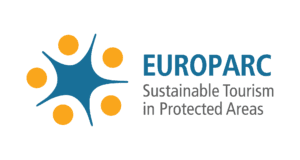
The “Advisory Board of Parks and Protected Areas Directors” is born
During the IX Congress of Federparchi, the “Advisory Board of Parks and Protected Areas Directors” has been formed. The Advisory Board is made up of ten members chosen among Italian Park directors and has the purpose of supporting the activities and functions of the statutory organs of the Italian Federation and contributing to the achievement of the associative goals.
The Advisory Board carries out scientific, technical and operational support activities, also in defining the action lines of the association and the protected areas system.
The members of the Advisory Board are elected by the assembly of directors, which is usually held in conjunction with the association’s congress and remain in office as the other statutory bodies.
The first meeting took place on October 25 during which he was elected as president Patrizio Scarpellini, director of the Cinque Terre Park.
The members of the Advisory Board are:
- Patrizio Scarpellini, president (Cinque Terre National Park)
- Stefano Donati (Vesuvio National Park)
- Maurizio Burlando (Tuscan Archipelago National Park)
- Domenico Nicoletti (Alta Murgia National Park)
- Augusto Navone (AMP Capo Carbonara – Villasimius)
- Tonino Miccio (AMP Campanella tip)
- Pierluigi Capone (Nazzano Tevere Farfa Regional Nature Reserve)
- Massimiliano Scotti (Regional Park Gola della Rossa and Frasassi)
- Maria Pia Pagliarusco (Po Delta Regional Park of Emilia Romagna)
- Bernardino Farchi (Valle Lambro Regional Park)
Sustainable Tourism: Training for Tomorrow >> EUROPARC joins new ERASMUS+ project
Building up curricula that address the particular needs of Protected Area professionals and delivering them through new, innovative and digital tools is a strong commitment of the EUROPARC Federation. Earlier this year, EUROPARC kick-started (as a leader), the project LIFE e-Natura2000.edu: Supporting e-learning and capacity building for Natura 2000 Managers, and last week joined an ERASMUS+ project to build the capacity of professionals in the field of sustainable tourism.
Sustainable Tourism: Training for Tomorrow
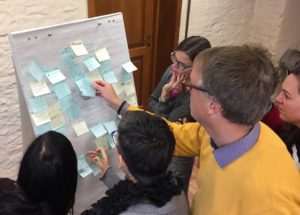
Project partners planning the outcomes and timing of the project, at kick-off meeting of the ERASMUS+ Project “Sustainable Tourism: Training for Tomorrow”, Italy, 2018
Last week, EUROPARC joined the kick-off meeting of the project “Sustainable Tourism: Training for Tomorrow”. The project runs for a period of 30 months and will be finished in Feb 2021. Funded through the ERASMUS+ Key Action 2 (Cooperation for innovation and the exchange of good practices and Strategic partnerships in the field of education and training), the project brought together partners working on different fields in the sustainable tourism sector:
- 2 universities: The Hasselt University (BE), who is also the project leader, and the University of Hull (UK)
- The network of European Protected Areas: EUROPARC Federation (DE)
- The network of ecotourism professionals in Spain: Asociacion de Ecoturismo en Espana (ES)
- 2 park authorities: Ente Parchi Emilia Occidentale (IT) and Montagne de Reims Nature Regional Park (FR)
Federparchi – EUROPARC Italy and the French Federation of Regional Nature Parks are also engaged in the project as associated project partners.
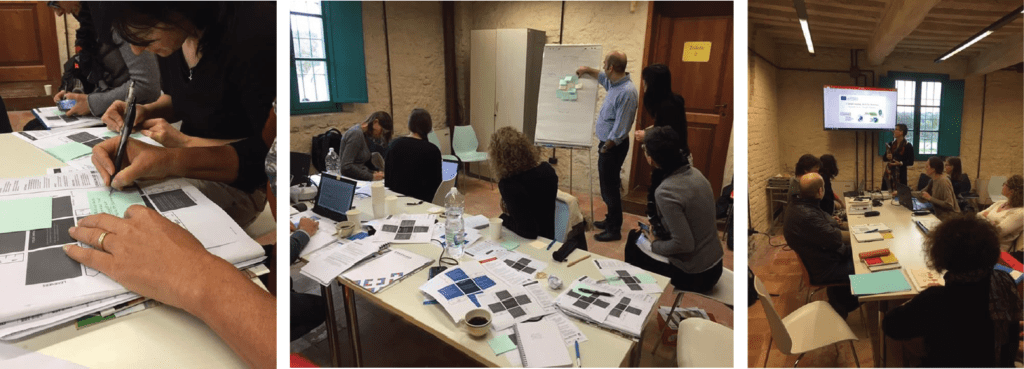
Collaborative work at the kick-off meeting of the ERASMUS+ Project “Sustainable Tourism: Training for Tomorrow”, Italy, 2018
Building the capacity of sustainable tourism professionals
Aiming at jointly develop a European standard for Sustainable Tourism Training for protected areas (Pas), drawing from the experiences of the EUROPARC Charter for Sustainable Tourism (itself a European tool), the partnership has the following objectives:
- to significantly increase the quality, supply and accessibility of training in sustainable tourism for PA stakeholders across Europe;
- to develop an innovative, open access, online training platform which will enable access to sustainable tourism training for PA staff, businesses, local/regional authorities, and others;
- to provide high-quality e-learning and ‘blended learning’ opportunities, through the creation of a new, up-to-date curriculum, and supported by a training toolkit, based on end users’ needs;
- to disseminate the training curriculum across European and national networks through a comprehensive programme of multiplier events and dissemination initiatives.
The project is designed to engage and deliver outcomes to:
- Staff of Protected Area authorities across Europe
- Local businesses operating in and around protected areas (e.g. hotels, restaurants, tour operators) who are collaborating with Protected Areas (or aim to) in driving sustainable tourism
- Staff of local authorities, development groups, business associations, conservation groups etc. who aim to partner with Protected Areas in the development of sustainable destinations
- Trainers involved in supporting PAs and their partners in driving sustainable tourism at business and Protected Areas destination level
Project outputs: a digital curriculum for Sustainable Tourism professionals
The first output of the project will be a ‘Sustainable Tourism Skills Report’ (based on a TNA – training needs analysis), which will be developed by the EUROPARC Federation with the support of all partners. The Hasselt University will then oversee the definition of a Sustainable tourism curriculum, which will be delivered as a training toolkit and be accessible in an online training platform. By the end of the project, partners will deliver a report with recommendations for policy and practice.
Throughout the project, there will be several opportunities for the EUROPARC network to participate.
Training workshops for Protected Areas staff, businesses and public partners will take place in Spain, France and Italy, as well as a transnational “train-the-trainer” workshop and a final international event for policymakers to disseminate the outcomes of te project.
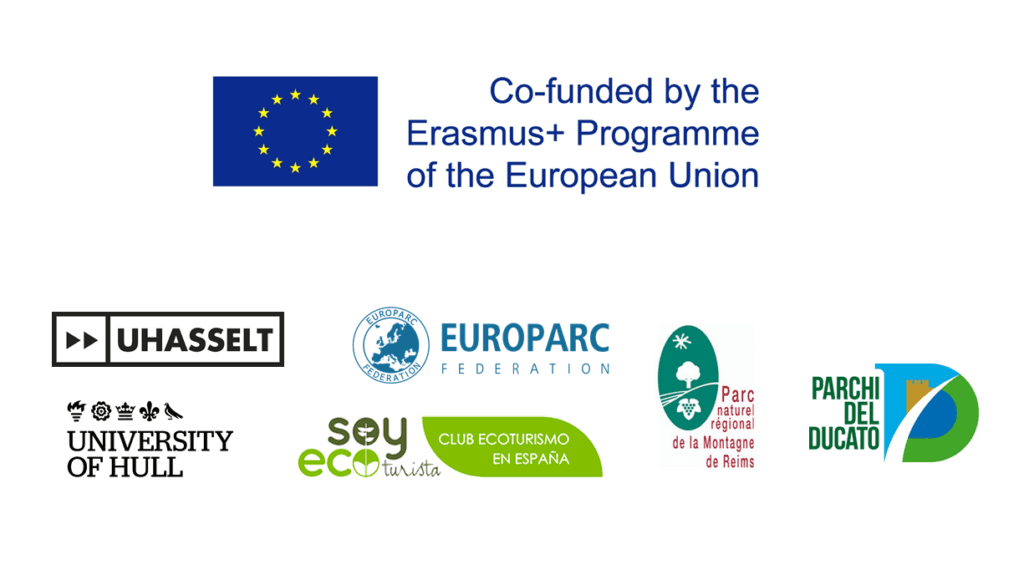
The Project “Sustainable Tourism: Training for Tomorrow” (STTfT) is funded through the ERASMUS+ Key Action 2-Cooperation for innovation and the exchange of good practices-Strategic partnerships in the field of education and training-Strategic Partnership supporting innovation.
